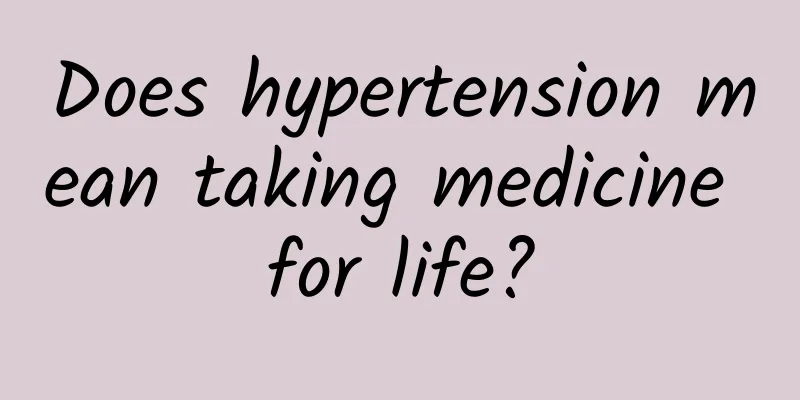Does hypertension mean taking medicine for life?

|
For many people who have found that their blood pressure is high, after completing relevant examinations in the hospital, the doctor diagnosed them with hypertension. If the doctor recommends taking oral antihypertensive drugs at this time, most people will have a question: Can I stop taking antihypertensive drugs? Is this true? Let's take a look together. For this question, first of all, we have to understand that taking high blood pressure medicine is different from addiction. It is not because of antihypertensive drugs that you cannot stop taking the medicine, but because the blood pressure is too high and needs to be lowered by drugs. Then can you stop taking it after it returns to normal? When it returns to normal after taking the medicine, it is because of the effect of the medicine. If you stop taking the medicine, your blood pressure will naturally rise, so of course you can't stop taking it. Hypertension is divided into two categories ① Secondary hypertension (hypertension with a known cause, accounting for about 5% of all hypertension) For this type of hypertension, you don't need to take antihypertensive drugs after finding and eliminating the cause. The most common one is primary aldosteronism. ②Essential hypertension (hypertension with no known cause, accounting for about 95% of all hypertension) This type of hypertension requires long-term medication, but if the systolic blood pressure drops below 110 mmHg during medication, or symptoms of hypotension such as dizziness appear, the antihypertensive drug needs to be reduced or stopped for observation. The reason why patients with hypertension need to take medication every day for life is not because hypertension drugs are addictive, but because high blood pressure itself is an "invisible killer". Hypertension not only causes symptoms such as dizziness and headache, but long-term high blood pressure will inevitably cause damage to the heart, brain, kidneys, and eyes. Therefore, taking antihypertensive drugs every day to control blood pressure within the normal range will bring far more benefits than not taking antihypertensive drugs. Warm reminder: Everyone only needs to understand one thing: taking antihypertensive drugs is to prevent long-term high blood pressure from causing damage to other organs in the body. Contributing author: Luo Yue, Cardiologist, Jinshan Hospital, First Affiliated Hospital of Chongqing Medical University Currently, he is mainly engaged in the clinical diagnosis and treatment and basic research of diseases such as hypertension, coronary heart disease, and heart failure. Participated in one Chongqing Natural Science Foundation project and published two SCI papers as the first author |
<<: Rumors debunked! People with diabetes can’t exercise? Here are 4 types of exercise you can do
Recommend
Treatment of adhesion of fallopian tube fimbria with traditional Chinese medicine
For diseases such as adhesion of the fallopian tu...
Gynecological diseases Menstrual irregular symptoms
Irregular menstruation is a common disease among ...
What is the appropriate water temperature for pregnant women to take a bath
What is the appropriate water temperature for pre...
Can Hamilton baby strollers be brought on planes? How about Hamilton baby strollers?
We all know that baby strollers are a common type...
Digua Game Center: Top 20 popular Android models in April 2012
The emergence of HTC's One X is undoubtedly a...
What are the symptoms of vulvar itching caused by Trichomonas vaginitis?
Trichomonas vaginitis is a common gynecological d...
What is the reason for uterine pain?
The most common uterine pain is dysmenorrhea, but...
Comment | A strong "baton" is needed to prevent and control myopia in children and adolescents
Written by Luo Zhongyun (commentator of this news...
Why do women have peculiar smell in their private parts?
Some women who do not pay attention to personal h...
Can I eat bayberry during menstruation?
Bayberry is a fruit with relatively high nutritio...
Will having wisdom teeth removed and taking X-rays affect pregnancy preparation?
It is best for women to prepare for pregnancy bef...
Professor Tian Yantao: How much do you know about the mysterious "stomach acid"
I believe that many people have a small medicine ...
Daily necessities needed for induced labor
With the development of society and the developme...
Female private parts care
As a woman, have you ever been embarrassed to tal...









